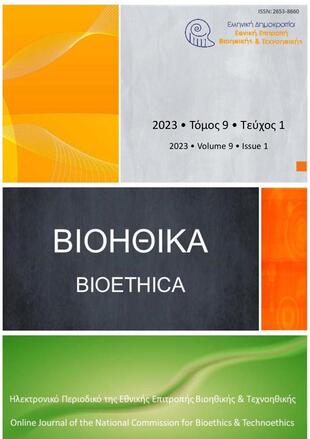Applications of Artificial Intelligence in clinical studies: Ethical dilemmas
Abstract
The application of Artificial Intelligence in Clinical Trials raises many ethical dilemmas concerning the ensuring of subjects' data, the transparency of processes, the implications on doctor-patient relationship and the healthcare decision-making. To investigate these dilemmas, the literature on AI' applications in clinical trials was reviewed and data were collected and analyzed. It was observed that applications of AI in patients' health monitoring, in discovery of novel therapeutic approaches, in diagnostics and in chronic diseases care contributed to better or non-inferior outcomes to conventional methods. Nevertheless, different bioethical issues emerge, such as the existence of biases in algorithmic models, the inadequacy of measures for the protection of subjects' data, the incapability for attributing responsibilities in case of system or clinical errors and the weaknesses in consent procedures and regulations. The relation of Artificial Intelligence and Health in the future is promising. Therefore it is of great significance to promote further investigation on ethical dilemmas that arise from the applications of AI in clinical trials, to outline the responsibilities, obligations and rights of patients and other stakeholders that take part in clinical research.
Article Details
- How to Cite
-
Sargiotis, G.-C. (2023). Applications of Artificial Intelligence in clinical studies: Ethical dilemmas. Bioethica, 9(1), 50–68. https://doi.org/10.12681/bioeth.34074
- Section
- Reviews

This work is licensed under a Creative Commons Attribution 4.0 International License.
Authors who publish with this journal agree to the following terms:
- Authors retain copyright and grant the journal right of first publication with the work simultaneously licensed under a Creative Commons Attribution CC BY 4.0 License, which allows for immediate free access to the work and permits any user to read, download, copy, distribute, print, search, or link to the full texts of articles, crawl them for indexing, pass them as data to software, or use them for any other lawful purpose. Appropriate credit must be given by citing the author(s) and the original publication in this journal.
- Authors are able to enter into separate, additional contractual arrangements for the non-exclusive distribution of the journal's published version of the work (e.g. post it to an institutional repository or publish it in a book), with an acknowledgement of its initial publication in this journal.
We encourage authors to deposit their articles, as well as data underlying the publications, in institutional and/or other appropriate subject repositories.
Bioethica permits and encourages authors to archive the final publication pdf in institutional (e.g. the repository of the National Hellenic Research Foundation) or other appropriate subject repositories (e.g. SSOAR repository for social sciences), in compliance with institutional and/or funder open access policies, after publication in the BIOETHICA. Authors must provide bibliographic details that credit publication in the journal, as well as related funding details (when applicable).
Lists of institutional and other subject-based academic open access repositories can be found listed by country at the registry http://opendoar.org/countrylist.php
If your institution does not possess a repository you may deposit a copy of your paper at no cost with www.zenodo.org , the repository supported for open access research in the EU by the European Commission, through the project OpenAIRE (www.openaire.eu )



